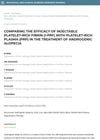Search
for
Did you mean Androgenetic Alopecia Treatment?
Sort by
Research
30 / 1000+ results
research Androgenetic Alopecia From A to Z
The book explains causes and treatments for common hair loss, its psychological effects, related health risks, and emphasizes early screening and lifestyle changes.

research Androgenetic Alopecia in Women
Female hair loss is often hereditary and can be treated with medication, hair transplants, and lasers.

research Unhealthy Diet and Lifestyle Factors Linked to Female Androgenetic Alopecia: A Community-Based Study from Jidong, China
Unhealthy diet and lifestyle choices may increase the risk of hair loss in women.

research The Effectiveness of 675 nm Wavelength Laser Therapy in the Treatment of Androgenetic Alopecia Among Indian Patients
675 nm laser therapy effectively improves hair growth in Indian patients with androgenetic alopecia.

research Medical Remedies for Alopecia
Natural treatments for alopecia are gaining interest due to fewer side effects.

research Comparing the Efficacy of Injectable Platelet-Rich Fibrin (I-PRF) with Platelet-Rich Plasma (PRP) in the Treatment of Androgenic Alopecia
Injectable platelet-rich fibrin (I-PRF) is more effective than platelet-rich plasma (PRP) for treating hair loss.

research Types and Treatment of Hair Loss in Men and Women
The article concludes that different types of hair loss require specific treatments and psychological support is important.

research The Effect of Mesenchymal Stem Cells Derived-Conditioned Media in Combination With Oral Anti-Androgenic Drugs on Male Pattern Baldness: An Animal Study
Combining stem cell-conditioned media with anti-androgen drugs can improve hair growth in male pattern baldness.

research The Effectiveness of 675 nm Wavelength Laser Therapy in the Treatment of Androgenetic Alopecia Among Indian Patients
675 nm laser therapy effectively improves hair growth and density in AGA patients.

research Does Androgenic Alopecia Aggravate the Risk of Prostate Cancer? Evidence from Mendelian Randomization
Male pattern baldness does not cause an increased risk of prostate cancer.

research Potential Application of PBM in Hair Follicle Organoid Culture for the Treatment of Androgenic Alopecia
Light therapy might help treat hereditary hair loss by improving hair follicle growth in lab cultures.
research Phytochemical Constitution, Anti-Inflammation, Anti-Androgen, and Hair Growth-Promoting Potential of Shallot (Allium Ascalonicum L.) Extract
Shallot extract may help with hair growth and treating hair loss.

research Alopecia: Overview, Causes, and Current Treatment Options
Early diagnosis is crucial for treating alopecia effectively.

research Hair Restoration Surgery: The State of the Art
Hair restoration surgery has advanced, focusing on natural results and may improve further with new techniques and therapies.

research Efficacy of Topical Latanoprost Versus Topical Minoxidil in the Treatment of Alopecia Areata: Clinical and Dermoscopic Study
Latanoprost is more effective than minoxidil for treating alopecia areata.

research Over-The-Counter Drugs Against Hair Loss
Most over-the-counter hair loss treatments lack strong evidence of effectiveness, except for minoxidil, which works but stops working if you stop using it.

research Signaling Pathways in Hair Aging
Hair aging is caused by stress, hormones, inflammation, and DNA damage affecting hair growth and color.

research Off-Label Prescription and Challenges in Clinical Practice: An Abridged Review
The review suggests doctors should carefully weigh risks and benefits of off-label drug use, involve patients in decisions, and calls for better regulations and monitoring.
research Androgenetic Alopecia From A to Z

research Hair Loss and Herbs for Treatment
Herbs can potentially treat hair loss by inhibiting a key enzyme and promoting hair growth, and deficiencies in zinc, biotin, and iron are linked to hair loss.
research Compliance to Topical Minoxidil and Reasons for Discontinuation Among Patients With Androgenetic Alopecia
Most patients stop using topical minoxidil due to side effects.

research Effectiveness and Safety of Botulinum Toxin Type A in the Treatment of Androgenetic Alopecia
BTA safely and effectively treats hair loss, and works better with FNS.

research Androgenetic Alopecia as a Cardiovascular Risk Factor
Hair loss may increase heart disease risk.

research Efficacy and Safety of Low-Level Light Therapy for Androgenetic Alopecia: A 24-Week, Randomized, Double-Blind, Self-Comparison, Sham Device-Controlled Trial
Low-level light therapy safely improves hair coverage, thickness, and count in androgenetic alopecia patients.

research A Systematic Review on Topical Marketed Formulations, Natural Products, and Oral Supplements to Prevent Androgenic Alopecia
Various treatments, including FDA-approved drugs, natural products, and oral supplements, can help with hair loss, but a patient's medical history and potential allergies should be considered when choosing a treatment.
research A Combination Therapy for Androgenic Alopecia Based on Quercetin and Zinc/Copper Dual-Doped Mesoporous Silica Nanocomposite Microneedle Patch
The microneedle patch with quercetin, zinc, and copper effectively promotes hair regrowth for androgenic alopecia.
research The Psychological Consequences of Androgenetic Alopecia: A Systematic Review
Androgenetic alopecia causes significant psychological distress, especially in women, and requires both medical and psychological support.
research Comparative Analysis of Scalp and Gut Microbiome in Androgenetic Alopecia: A Korean Cross-Sectional Study
The scalp microbiome is more diverse and may be more important in hair loss than the gut microbiome.

research Acquired Scalp Alopecia: A Review
Early diagnosis and treatment are crucial for preventing permanent hair loss in various scalp conditions, and while new treatments are promising, more research is needed to evaluate their effectiveness.